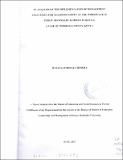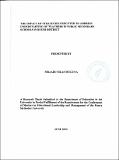| dc.contributor.author | M’mbwanga, Maresi Maureen | |
| dc.contributor.author | Maore, Stephen | |
| dc.contributor.author | Were, Elizabeth | |
| dc.date.accessioned | 2021-12-03T13:25:42Z | |
| dc.date.available | 2021-12-03T13:25:42Z | |
| dc.date.issued | 2021-06 | |
| dc.identifier.uri | DOI: 10.9790/487X-2306041429 | |
| dc.identifier.uri | http://repository.kemu.ac.ke/handle/123456789/1281 | |
| dc.description.abstract | Organizational conflict arises when and if employee thinks that their goals are under threat or are being
hindered by the another person’s activities. Unresolved or poor handling of conflicts may lead to exit of some
employees from the organization. The purpose of the study was to assess how conflict management strategies
influence performance of Microfinance Institutions. The study was guided by the following specific objectives:
To explore the influence of accommodating strategy on performance of Microfinance Institutions; To assess
how dominating strategy affects performance of Microfinance Institutions; To determine the influence of
compromise strategy on performance of Microfinance Institutions, and; To examine the influence of
collaborating strategy on performance of Microfinance. The research study looked at the contingency theory,
stakeholder theory and human relations management theory. The study employed descriptive survey research
design. The study targeted 90 managers of MFIs that operate within Nairobi. A census method was adopted by
the study. Questionnaires were used as the research instrument. The researcher confirmed validity of the
instrument by discussing the questionnaire with research project supervisors who are experts in research. So as
to confirm reliability of the instrument, the researcher did a pilot test. The questionnaires were administered
using the method of drop and pick later. The gathered data information was coded and then analyzed by use of
SPSS. In summary, the regression model showed: a significant inverse relationship between accommodating
strategy and performance of MFIs in Nairobi; A significant positive relationship between dominating strategy
and performance of MFIs in Nairobi; A significant negative relationship between compromise strategy and
performance of MFIs in Nairobi, and; A significant direct relationship between collaborating strategy and
performance of MFIs in Nairobi. The research concludes that: there existed an inverse relationship between
accommodating strategy and performance of MFIs in Nairobi shown by coefficient value of -0.293 and
significance value of 0.008; there exists a significant positive relationship between dominating strategy and
performance of MFIs in Nairobi shown by coefficient of 0.694 and significance value of 0.000; There existed a
negative correlation between compromise strategy and performance of MFIs in Nairobi shown by coefficient of
-0.530 and significance value of 0.003, and; there was a direct relationship between collaborating strategy and
performance of MFIs in Nairobi shown by coefficient of 1.121 and significance value of 0.000. The study
recommended that: Managers should avoid using accommodating and compromise strategies unless it is very
necessary, and; managers should always use dominating and collaborating strategies as they have direct
relationship with organizational performance. For further studies, the study recommended that more research
studies be done on: other financial institutions; nonfinancial institutions, and; publicly owned organizations.
The findings of this study will be of benefit to various parties. These include managers of MFIs, managers of
other related institutions and businesses, regulating bodies and researchers and scholars. | en_US |
| dc.language.iso | en | en_US |
| dc.publisher | IOSR Journal of Business and Management (IOSR-JBM) | en_US |
| dc.relation.ispartofseries | vol 23;(6) | |
| dc.subject | Accommodating strategy; Dominating strategy; Compromise strategy; Collaborating strategy; Organizational performance | en_US |
| dc.title | Conflict management strategies and organizational performance (A survey of microfinance institutions in Nairobi) | en_US |
| dc.type | Article | en_US |




